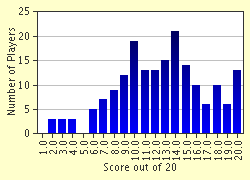Quiz Answer Key and Fun Facts
1. 'Sesquipedalian', meaning 'having many syllables', is derived from Latin words meaning what?
2. 'Rostrum', meaning 'a stage for public speaking', is derived from the Latin verb 'rodere', which means what?
3. 'Careen', meaning 'to sway from side to side', is derived from the Latin 'carina', meaning what?
4. 'Supercilious', meaning 'patronizingly haughty', is derived from the Latin 'super', meaning above, and 'cilium', which stands for which body part?
5. 'Penumbra' is derived from the Latin word 'umbra', meaning what?
6. 'Cynosure'. meaning a 'guide', or a 'center of attention', meant what in Greek or Latin?
7. 'Megalopolis', meaning a densely populated area, was the name of an actual city in what ancient land?
8. 'Desultory', meaning 'marked by lack of a definite plan', comes from the Latin word 'desultor' which meant what?
9. 'Subjugate' was derived from the Latin 'jugum', meaning what?
10. Which planet gave its name to a word meaning 'having rapid and unpredictable changes of mood'?
11. Of special interest are words derived from real people or characters. For example, the word 'quisling', meaning a traitor, especially someone who betrays his own country by cooperating with an occupying enemy, was derived from Vidkun Quisling (1887-1945), who was from what country?
12. The word 'gerrymander' was derived from Elbridge Gerry, who created an artificial-looking voting district in which locale?
13. 'Malapropism', meaning 'the ridiculous misuse of words, is derived from a character in a play by whom?
14. 'Spoonerism', meaning the unintentional interchange of sounds, often initial sounds, was derived from W. A. Spooner (1844-1930), who was what?
15. 'Quixotic' is derived from Don Quixote, a character in a novel by whom?
16. We finish with some animal references. 'Alopecia', meaning 'baldness', is derived from a Greek word for which animal?
17. 'Gossamer', meaning delicate or flimsy, is derived from a Middle English word for which animal?
18. 'Lupine' is derived from the Latin 'lupus', which means what animal?
19. 'Porcine' is derived from the Latin 'porcinus', meaning which animal?
20. 'Simian' is derived from the Latin 'simia', meaning which animal?
Source: Author
chessart
This quiz was reviewed by FunTrivia editor
CellarDoor before going online.
Any errors found in FunTrivia content are routinely corrected through our feedback system.
